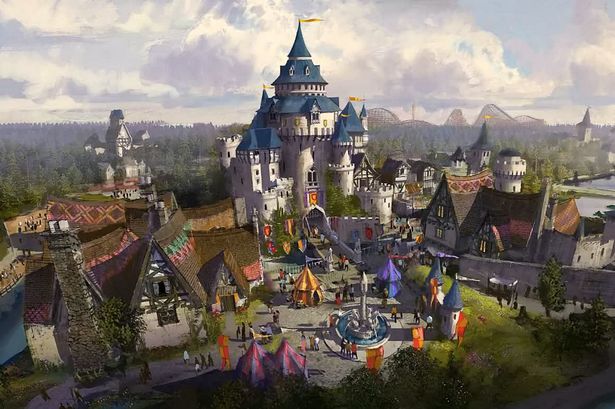The London Resort, a sprawling entertainment complex initially envisioned in 2012, promised to revolutionize the UK’s leisure landscape. Projected as a world-class destination rivalling Disneyland Paris, the ambitious project proposed a vibrant tapestry of themed lands, thrilling attractions, and immersive experiences. Central to the vision was the construction of six exhilarating roller coasters, designed to cater to a wide spectrum of thrill-seekers, from families seeking gentle adventures to adrenaline junkies craving extreme G-forces. These coasters, alongside a plethora of other rides and attractions, were to be woven into distinct themed zones, each offering a unique narrative and immersive environment, drawing inspiration from popular culture, literature, and fantastical realms. Crowning this ambitious park was the planned centerpiece – a majestic fairytale castle, a beacon of enchantment and wonder, strategically positioned on the peninsula overlooking the Thames Estuary near Dartford in Kent. This prominent placement would offer breathtaking views of the surrounding landscape, adding to the overall grandeur and appeal of the resort.
The project’s initial plans outlined a phased development, with the first phase slated to open in 2024, followed by a second phase in 2029. This strategic approach aimed to manage the scale and complexity of the undertaking, allowing for adjustments and refinements based on market feedback and operational experience. The projected cost of the resort ran into billions of pounds, underlining the scale and ambition of the project, which aimed to create thousands of jobs and inject a significant boost into the local and regional economies. The London Resort was positioned not merely as a theme park, but as a comprehensive entertainment destination, encompassing hotels, restaurants, retail spaces, and convention facilities, offering a complete leisure and business experience for a diverse range of visitors. The resort envisioned attracting both domestic and international tourists, aiming to become a major draw for the UK tourism industry and a significant contributor to the national economy.
However, the journey of the London Resort has been fraught with challenges, encountering numerous hurdles and setbacks that have significantly impacted its timeline and trajectory. Planning permission processes proved complex and protracted, with concerns raised about the environmental impact of the project, particularly its potential effects on the surrounding ecosystems and wildlife habitats. The area chosen for development, the Swanscombe Peninsula, is a designated Site of Special Scientific Interest (SSSI), home to diverse flora and fauna, adding further layers of complexity to the environmental impact assessments and mitigation strategies required for the project to proceed. These environmental considerations necessitated extensive consultations with relevant stakeholders, including environmental agencies and local communities, further delaying the project’s progression.
In addition to environmental hurdles, the London Resort also faced financial challenges, with securing the necessary funding proving to be a significant obstacle. The sheer scale of the project required substantial investment, and securing commitments from investors amidst evolving economic conditions and market uncertainties added to the complexities. The project’s developers explored various funding models and partnerships, navigating a complex landscape of financial negotiations and agreements to ensure the project’s financial viability. These challenges further contributed to delays and revisions to the original plans, necessitating strategic adjustments to the project’s scope and timeline.
Furthermore, the withdrawal of key partners and stakeholders presented significant challenges for the London Resort project. Paramount Pictures, initially involved in the project’s development, withdrew their involvement, impacting the planned theming and intellectual property rights associated with the resort. This necessitated a reassessment of the overall thematic direction and the development of new concepts and partnerships to replace the void left by Paramount’s departure. Adapting to these changes required significant flexibility and resourcefulness from the development team, further impacting the project’s trajectory and adding to the already intricate web of challenges.
Despite these setbacks, the London Resort project, though significantly altered from its initial grandiose vision, is not entirely abandoned. Revised plans have been submitted, reflecting a more scaled-down and pragmatic approach, acknowledging the challenges faced and adapting to the evolving circumstances. The revised proposals focus on a more phased approach, with a greater emphasis on sustainability and environmental considerations, aiming to address the concerns raised by environmental agencies and local communities. The future of the London Resort remains uncertain, but the developers continue to pursue their vision of creating a world-class entertainment destination in the UK, albeit one that has undergone significant transformations and adaptations in response to the challenges encountered along the way. The project’s story reflects the complexities of large-scale development projects, highlighting the interplay of environmental, financial, and logistical considerations that shape their evolution and ultimate realization.














